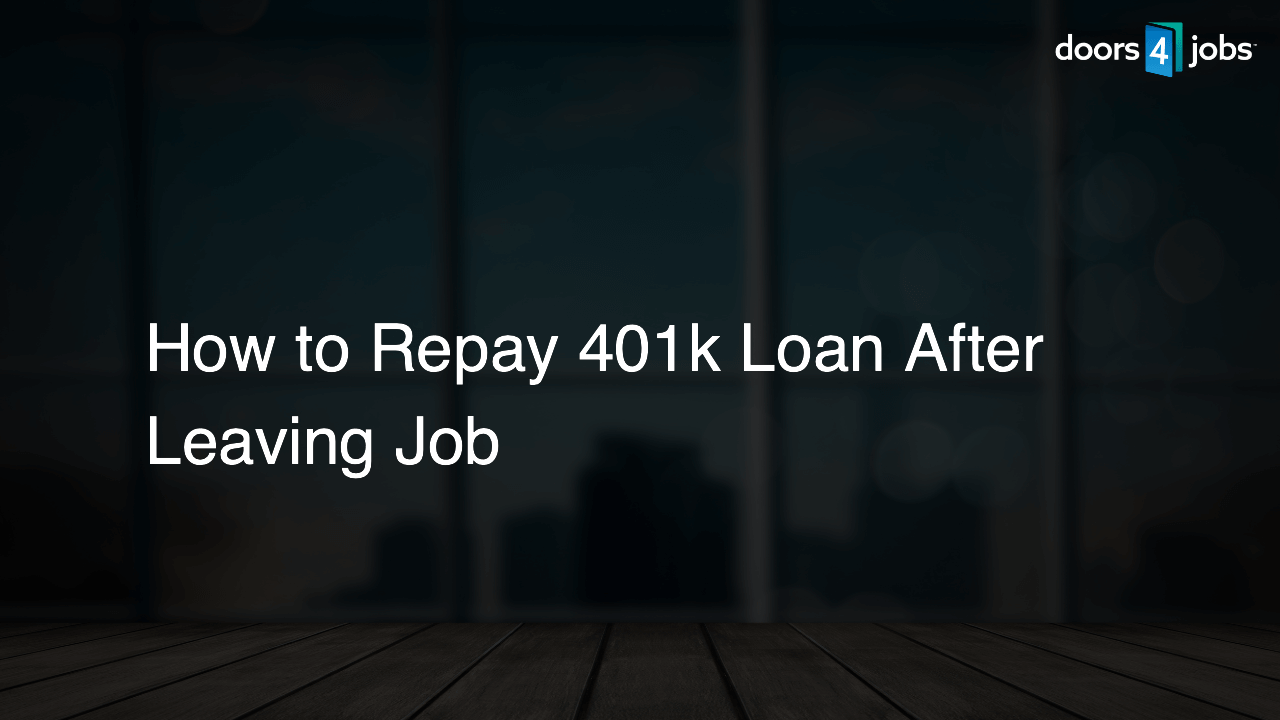After leaving a job, it’s essential to repay your 401k loan to avoid potential taxes and penalties. To do this, you can either pay the outstanding balance in a lump sum, refinance the loan to transfer it to an individual retirement account (IRA), or roll over the funds to a new employer-sponsored plan if permissible. If you’re unable to repay the loan, it may be considered a taxable distribution, and you could face additional penalties if you’re under 59½ years old.
How to Repay 401k Loan After Leaving Job
1. Paying Off the Outstanding Balance
One of the most straightforward ways to repay a 401k loan after leaving a job is to pay off the outstanding balance in a lump sum. Contact your 401k plan administrator for the exact amount owed and make arrangements for repayment. Note that you typically have a grace period of 60 to 90 days to repay the loan after your termination date.
2. Refinancing the Loan into an IRA
If you cannot pay the full balance in a lump sum, consider refinancing the loan by transferring it to an individual retirement account (IRA). Work with a financial advisor or an IRA management firm to set up a new account and convert your outstanding loan balance into a loan against your IRA. This option can help you avoid the potential taxes and penalties associated with an unpaid 401k loan.
3. Rolling Over Funds to a New Employer-Sponsored Plan
If you’ve secured a new job and your new employer offers a sponsored retirement plan, you might be able to roll over your outstanding 401k loan balance into this new account. Before doing this, ensure that your new employer’s plan allows for loans and rollovers. Speak with your new plan’s administrator for directions and complete the necessary paperwork to execute the rollover.
4. Managing the Taxable Distribution
If you’re unable to repay the 401k loan or choose not to, the unpaid loan will be treated as a taxable distribution. In this case, you’ll be required to report the distribution as income on your tax return and may face additional penalties if you’re under 59½ years of age. Consult a financial advisor or tax expert to determine the best course of action for your specific situation.
5. Preventive Measures for Future Loans
To avoid similar challenges in the future, consider alternative financing options before taking a 401k loan. Set up an emergency fund, explore personal loans, or look into a home equity line of credit (HELOC) as potential alternatives. These options can help reduce the risk of encountering complications related to job changes and 401k loans.
How to Repay 401k Loan After Leaving Job
1. Paying Off the Outstanding Balance
One of the most straightforward ways to repay a 401k loan after leaving a job is to pay off the outstanding balance in a lump sum. Contact your 401k plan administrator for the exact amount owed and make arrangements for repayment. Note that you typically have a grace period of 60 to 90 days to repay the loan after your termination date.
2. Refinancing the Loan into an IRA
If you cannot pay the full balance in a lump sum, consider refinancing the loan by transferring it to an individual retirement account (IRA). Work with a financial advisor or an IRA management firm to set up a new account and convert your outstanding loan balance into a loan against your IRA. This option can help you avoid the potential taxes and penalties associated with an unpaid 401k loan.
3. Rolling Over Funds to a New Employer-Sponsored Plan
If you’ve secured a new job and your new employer offers a sponsored retirement plan, you might be able to roll over your outstanding 401k loan balance into this new account. Before doing this, ensure that your new employer’s plan allows for loans and rollovers. Speak with your new plan’s administrator for directions and complete the necessary paperwork to execute the rollover.
4. Managing the Taxable Distribution
If you’re unable to repay the 401k loan or choose not to, the unpaid loan will be treated as a taxable distribution. In this case, you’ll be required to report the distribution as income on your tax return and may face additional penalties if you’re under 59½ years of age. Consult a financial advisor or tax expert to determine the best course of action for your specific situation.
5. Preventive Measures for Future Loans
To avoid similar challenges in the future, consider alternative financing options before taking a 401k loan. Set up an emergency fund, explore personal loans, or look into a home equity line of credit (HELOC) as potential alternatives. These options can help reduce the risk of encountering complications related to job changes and 401k loans.
6. Communicate with Your 401k Plan Administrator
Keep the lines of communication open with your plan administrator throughout the process of repaying your loan. They can provide you with information on the loan balance, grace periods, and any changes to the repayment terms. Moreover, they can assist you with any necessary paperwork and facilitate steps in the repayment process, such as refinancing or rolling over the loan.
7. Consider the Impact on Your Retirement Savings
When addressing your 401k loan repayment after leaving a job, assess the long-term impact on your retirement savings. Unpaid loans or early withdrawals may lead to reduced investment growth and lost potential earnings. By understanding the consequences of different repayment methods, you can make informed decisions to safeguard your financial future and ensure your retirement savings stay on track.
FAQ Section
Below, you’ll find answers to some common questions related to repaying a 401k loan after leaving a job:
How long do I have to repay my 401k loan after leaving my job?
Typically, you have a grace period of 60 to 90 days to repay your 401k loan after your termination date. However, the exact timeframe will depend on your 401k plan’s terms and conditions, so consult with your plan administrator for specific details.
Can I continue making regular payments on my 401k loan after leaving my job instead of paying it off in a lump sum?
Most 401k plans require full repayment of the outstanding loan balance after you leave your job. Continuing with regular payments is usually not allowed, but you can speak with your plan administrator for any possible alternatives or refer to the provisions of your specific 401k plan.
What happens if I fail to repay my 401k loan?
If you fail to repay your 401k loan, it will generally be treated as a taxable distribution. You’ll be required to report the unpaid loan balance as income on your tax return, and you may face additional penalties if you’re under 59½ years of age.
Can I roll over my 401k loan into an IRA without repaying it first?
You cannot directly roll over an unpaid 401k loan into an IRA. However, you can refinance the outstanding loan balance by setting up a new loan against your IRA, effectively transferring the loan from your 401k to the IRA. This process can help you avoid potential taxes and penalties associated with an unpaid loan.
Is it possible to avoid taxes and penalties if I’m unable to repay my 401k loan?
While it may be challenging to completely avoid taxes and penalties, you could minimize the impact by refinancing the loan into an IRA or rolling over the funds into a new employer-sponsored retirement plan. In either case, working with a financial advisor or tax expert can help you make informed decisions and potentially mitigate the financial consequences.











